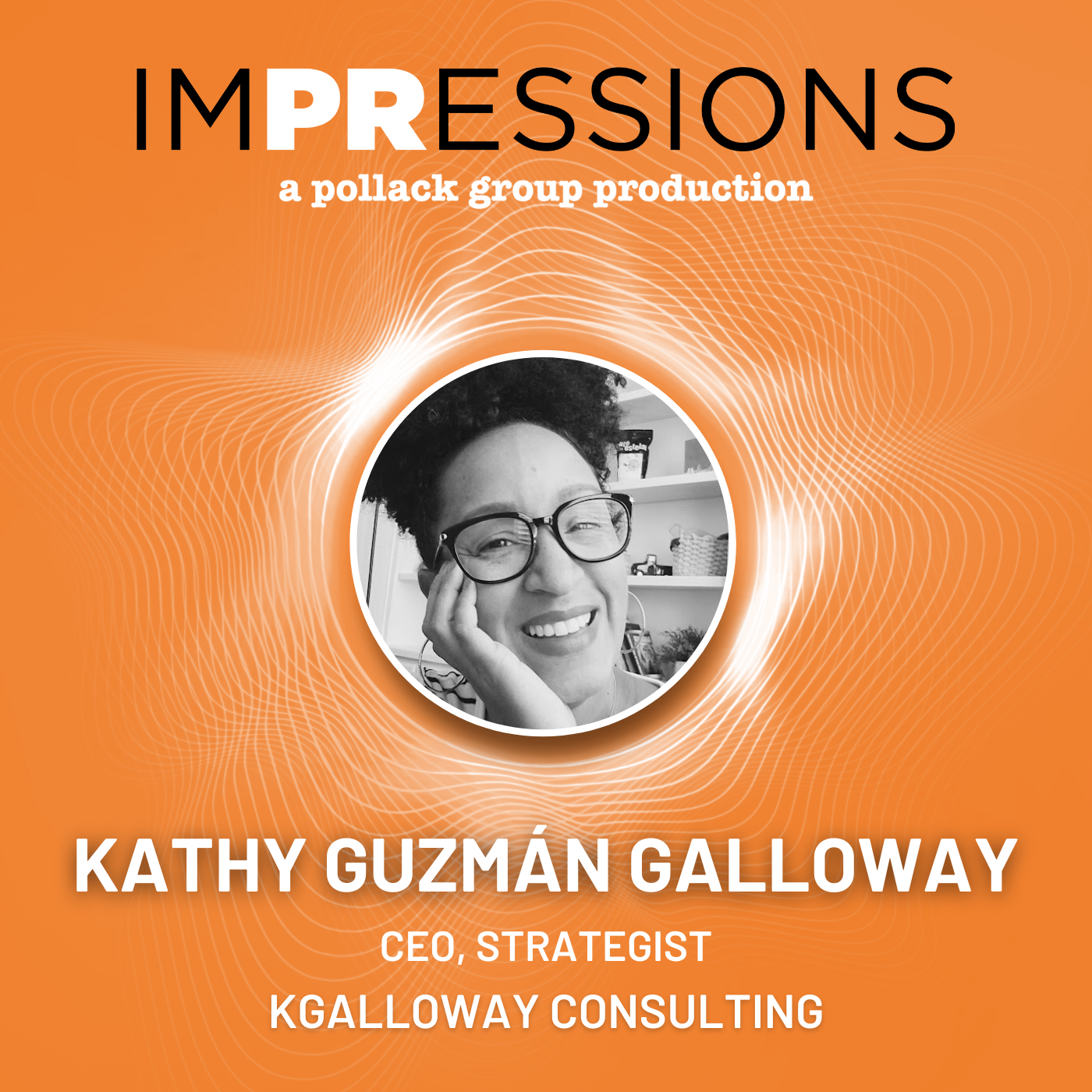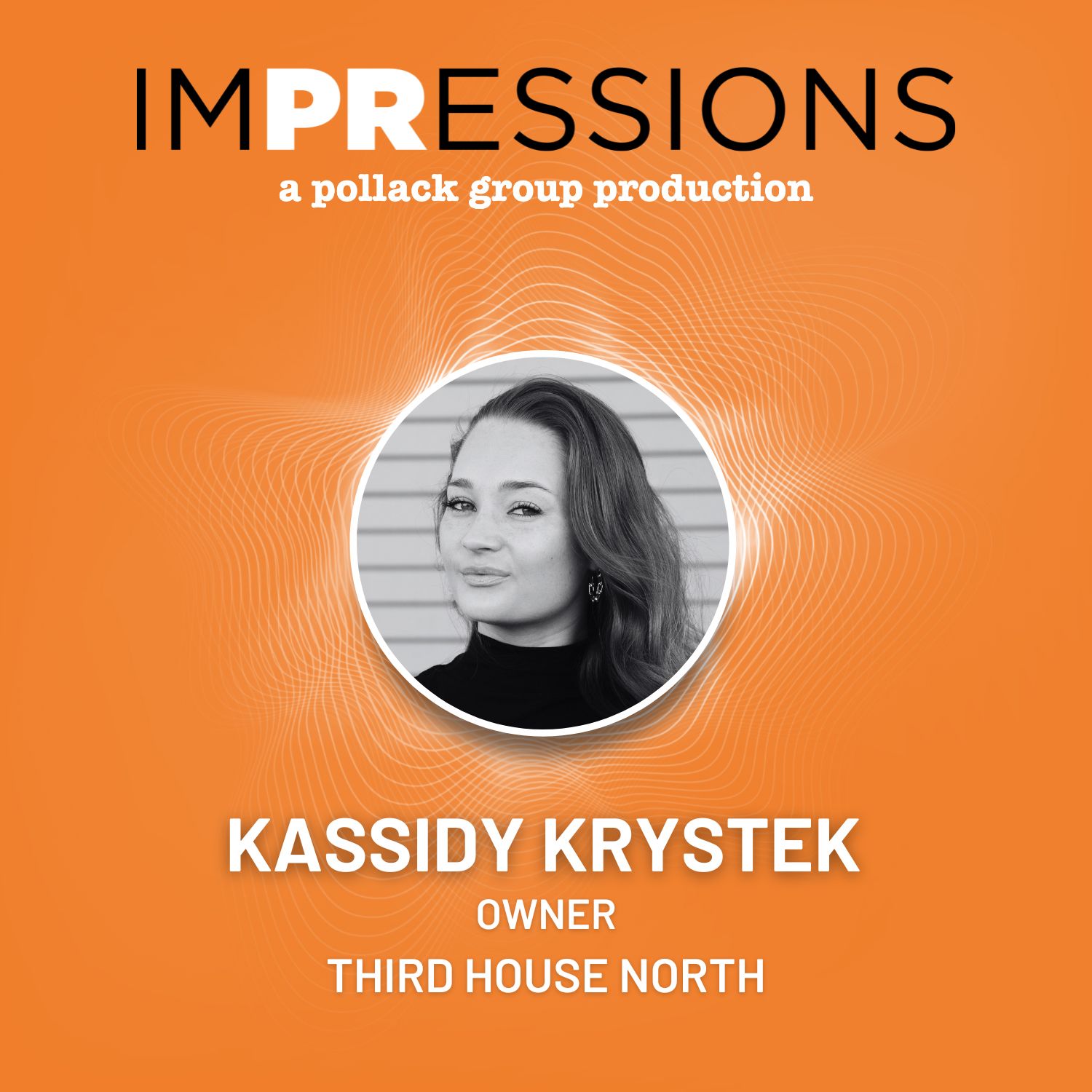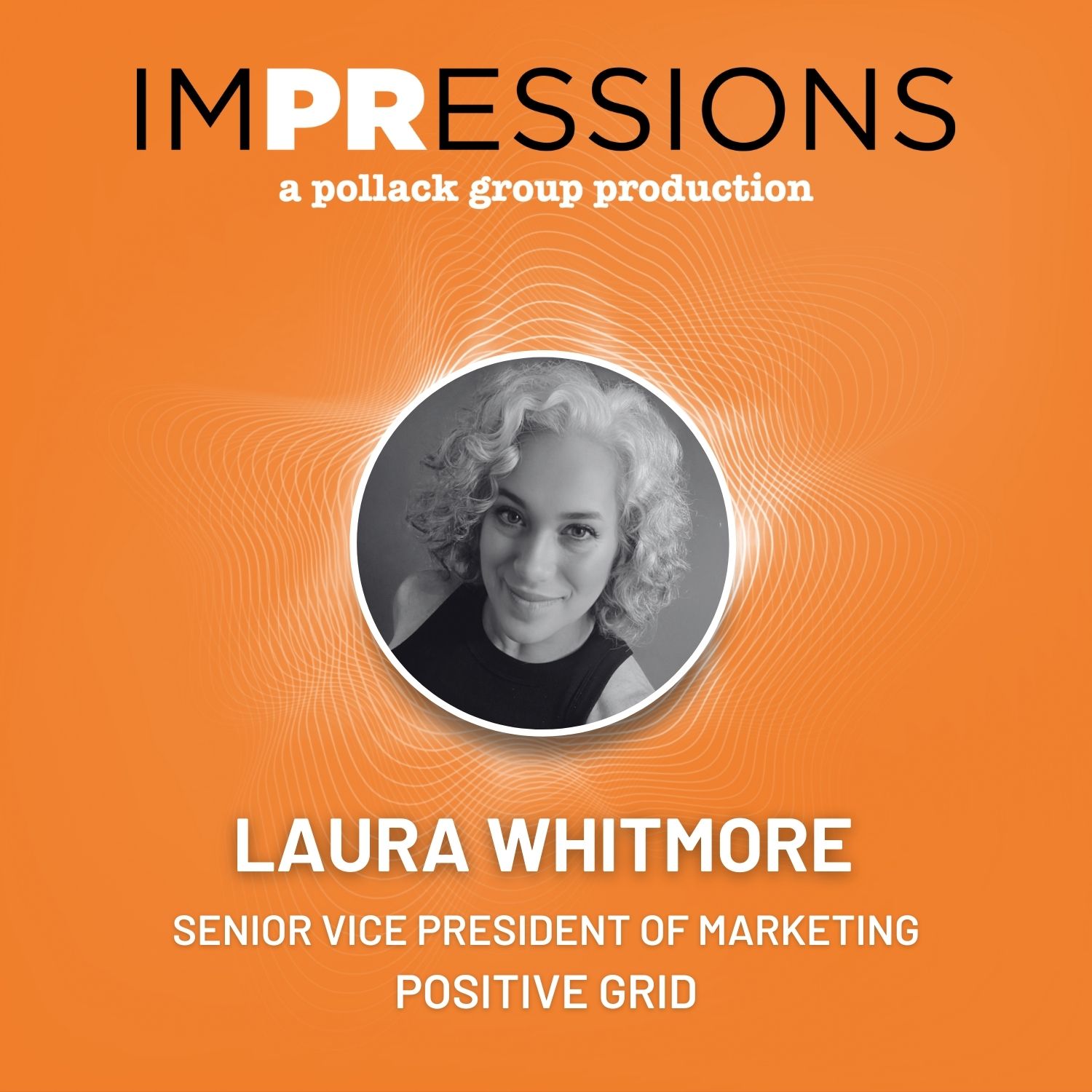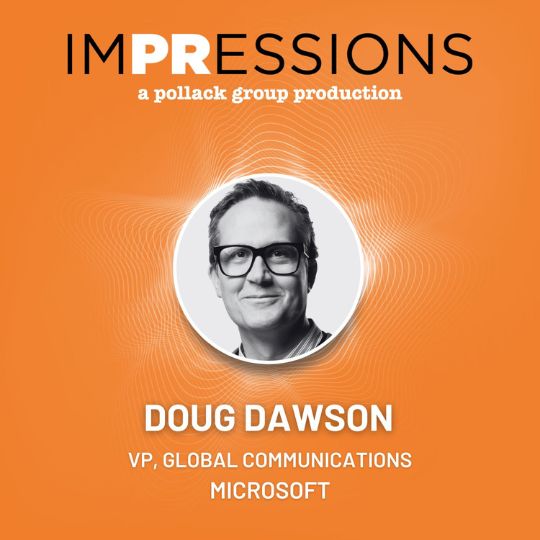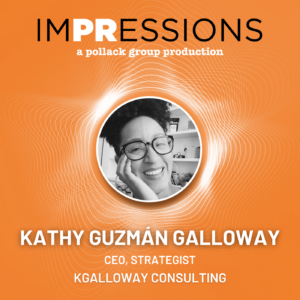 Episode 10 of imPRessions covers an important topic – brand fundamentals. Before the glitz and glamour of building a comprehensive PR and marketing strategy, organizations need to identify what their value proposition is, a task often overlooked by budding new businesses. Thankfully, our conversation today covers how leaders can drive growth with a bit of innovation and lots of brand therapy. Kathy Guzman Galloway has been a marketing professional for over 20 years and shares her expertise on how she helps businesses of all sizes discover purpose.
Episode 10 of imPRessions covers an important topic – brand fundamentals. Before the glitz and glamour of building a comprehensive PR and marketing strategy, organizations need to identify what their value proposition is, a task often overlooked by budding new businesses. Thankfully, our conversation today covers how leaders can drive growth with a bit of innovation and lots of brand therapy. Kathy Guzman Galloway has been a marketing professional for over 20 years and shares her expertise on how she helps businesses of all sizes discover purpose.
ImPRessions Episode #10 Transcript
Kalli: When businesses want to expand. The usual first is to put a marketing or PR plan together. Whether you have an in-house team or hire an agency, many think the first step to growth is a comprehensive social media strategy or a prime-time interview on a major network when in fact, before the marketing glamor, businesses need to identify and truly grasp what their brand fundamentals are. Kathy Guzman Galloway helps businesses do just that. With over 20 years of marketing and consulting experience, Kathy paves the way for businesses to drive growth through strategy and innovation with a little term I personally love- brand therapy. Hi Kathy. Thanks for joining us today.
Kathy: Hello. Thank you. I’m excited to be here.
Jenn: I love any word that contains therapy, to be honest. It’s so important. And you have had quite the career working in the consumer packaged goods industry, most notably at PepsiCo. So tell us a little bit about how you got your start and how your time there led you to your career path today and giving brands and people, individuals all over the brand therapy that they need.
Kathy: Yeah. Thank you for the question. I actually started at Nextel, which was then purchased by Sprint and I was on the team who launched a new cell phone service called Boost at the time. And I remember being on this cross-functional team and I was in operations and I saw the lead of this team, the marketer, and I thought, Oh my God, I need to do this work. He was listening to what the consumer wanted. He was merging that with the business needs and developing something that was going to be in market for years and years to come. And I thought that this is something I need to do. That led me to the MBA program at the University of Texas at Austin and eventually found my way to PepsiCo through the Frito-Lay division that is still in north Texas. And I have never looked back. I absolutely loved just being so close to the consumer and really figuring out how do we create delight and joy in someone and what a great place to do it. Then Lay’s potato chips, right, which is literally what they’re about, is about joy. And so being at PepsiCo, I was there about eight years. I got that entrepreneurial bug and eventually, after a couple other roles, decided to start my own consulting gig. And just a couple of weeks ago, I celebrated my ten year anniversary as a consultant, and I have never been happier with a career path. For me, it’s really given me the opportunity to focus on the things that matter to me as well as the things that I’m really good at. So my skills and my passions really coming together and and it’s been wonderful. And so now I spend my time working with brands from Fortune 500 all the way to startups. And every brand is a different challenge and brings me excitement everywhere I turn.
Kalli: That’s really amazing. And congratulations on that milestone, Kathy. That’s really exciting.
Kathy: Thank you.
Kalli: You said you helped brands create a strategic foundation with purpose, mission and brand positioning. Can you tell us a little bit more about what brand fundamentals are?
Kathy: Yeah, absolutely. Brand fundamentals are the starting point for any brands in the marketplace. I talk about two components of a brand and a brand development. On the one side are brand fundamentals, which are very altruistic. It’s about what you are bringing to the world and how you are hoping to have an impact on people, places or things. On the other side are all our strategic activities. This is very much about the wins we hope to achieve. This is where vision exists. This is where innovation plans are. This is where we think about growth plans. And these two pieces of the puzzle come together to build a strong brand and a strong business. A lot of companies focus on the strategy side. What’s our retail strategy? How are we going to price this? How can we get our costs down? How do we think about hiring teams? ET cetera. And often they miss the details and the real thinking time. On the brand fundamentals side, brand fundamentals set the stage for everything else. It starts with purpose, which is really saying, Why am I even spending all of my time doing this work, especially for a startup? I’m putting all this time and effort into something. Why am I doing that? The mission is what translates purpose into action. It says This is what I’m going to do about this problem specifically. And then the last piece of that, that’s kind of the link. Between them would be positioning and brand Positioning is about how do I do that? Who am I serving? Why should they care? How am I better different than other solutions that are available to the end user, to the consumer and then surrounding purpose, mission and positioning is brand identity and then brand values. And these are the things that dictate what we look like, how we talk and how we represent ourselves in the world. So these five components come together to really give us a place again to jump off of as a brand and help to ensure that every choice we are making on the strategy side is aligned with a bigger goal, a bigger objective, a bigger call to action. I really learned a lot about that just coming through the PepsiCo universe. And I can see now, even working with so many companies large and small, that a lot of those pieces are often missing and that can be a challenge.
Jenn: Yeah. So I want to talk a little bit more about that brand purpose. So I’m wondering, is brand purpose just for purpose-driven brands like so for instance, like your big corporations such as PepsiCo looking to make a societal impact? Or can any brand, big or small, find their purpose? And if so, how do they define that or create that purpose?
Kathy: That’s an excellent question because I find that I get a lot of resistance or maybe disbelief from some, particularly on the startup side and some founders who feel that purpose just isn’t for their organization or for their brand. And in reality, purpose is for every single brand company, team, anyone and everyone can and should have a purpose from which they start. I think where we as a society have done an injustice to brand purpose or to purpose in general is that as companies have launched with these social missions, we’ve attached purpose to that. That being purpose driven means I’ve got to, you know, help folks in Africa have access to clean water, that I’ve got to help women in South America build their own businesses. And that’s not true. That certainly can be part of your purpose.
I’ll give you an example of a brand. I recently worked with a brand of hard seltzer. You too, can have a purpose in working with this particular brand. What we got to is that their purpose was to to help us live into the moment. And it’s not about giving back to a cause, but it is about what drives this organization day to day. We want everyone to have that moment of enjoyment without having to sacrifice, and that can easily be a purpose for your business. So again, it doesn’t need to be tied to a social mission. It needs to be tied to what is important to you, what is meaningful to the brand, and how we can articulate that in a way that feels compelling, actionable and exciting to both yourself as a brand owner and to anyone who is on your team. And and without that, I think you really miss an opportunity for that deep engagement and that deep connection that you and your team can have as part of that brand, not to mention investors and retailers and partners. Anyone that you’re really trying to bring into your team to help you move the needle forward, that purpose can really galvanize a lot of that.
Kalli: Yeah, that that’s really great. I want to take a step back and I know we spoke about this earlier about our favorite term brand therapy. You know, it really is such a great term because who doesn’t need a little therapy in their life? You know, whether you’re talking to a therapist because you’re going through a hard time or you just want to relax some aromatherapy or enjoy my favorite type of therapy, shopping therapy, retail therapy therapy is that’s a lifesaver or any of these things. They really have such benefits and they just help make everything better, you know, for companies like how do you work with them to counsel them and lead them to be better and find a more refined path?
Kathy: What’s funny about brand therapy is that a client of mine was the one who coined that after they had the experience of kind of working with me and what my process looks like, They said this is, this is like therapy for our brand therapy for our team. Another client recently said that I was a brand doula that is sort of here to help them navigate. And that’s really what this is. What both of those terms really about is. I feel very strongly that your brand fundamentals as a brand owner need to come from you. These are elements that you as the lover, the passion behind the brand need to be able to articulate and that you should never have an external party doing. Doing that for you? I know sometimes agencies will offer that as a service, but if they’re writing this stuff for you and bringing it back, it is not done correctly. It really needs to come from the brand owner or from the team. And what is challenging about that when you’re on your own, if you’re sitting in a room saying, let’s work on our brand purpose, is that your mind is flooded with so many possibilities. This is part of the reason I even created brand fundamentals is I found that especially on the founders side, not so much on the corporate environment where it’s a little easier for you to separate yourself from the business. But on the startup side, we’re so passionate and committed to this business that we’ve got this gigantic long list of all the things this means. I want to, you know, save children in Africa, but also I have this low calorie, low sugar product that is all about healthfulness. And also we pay fair wages. And so our values are important and so much more. And that really makes it difficult for brand owners to figure out what is most important and how do we articulate all these pieces of information in a clear way. And this is where the brand therapy comes into play. What my role is with with a team is to ask the questions, ask probing questions, ask them again, ask them in a different way, give them things to think about and challenge what they’re saying to make sure that they feel really passionate about that and then help them articulate it in a way that is very clear its purpose, its mission, its positioning, its values. And those four buckets in particular are the ones where information can often feel confusing. What’s purpose versus value? What’s mission versus positioning? And having someone like me to guide you through that process? Just having that objective observer really helps you to clarify each of those points in a way that can be really difficult for you to do on your own. And that really is what brand therapy is about, not that different from a therapist as, as you both were saying, which I also love therapy, love my therapist, and feel really strongly about that as well.
Jenn: 100%. It’s so true. And I love to how you were saying a lot of companies will come to agencies without having those fundamentals. And Kelly and I, you know, we work in an agency every time we have a new client, we always see that same thing as well. It’s like, well, what? What’s your value proposition? Who are you? What’s your identity? And many of them don’t really know. And so it’s interesting because they’re trying to get a marketing firm to help with their marketing, to help with their social media, to help with their PR, But we’re like, hold on. Before we do any of that, we have to create like a messaging map and detail every intricate piece of information about who you are so that we know how to pitch you and how to talk about you. So and guess what I want to know is this brand therapy. How does it differ when you’re working with a large established brand compared to maybe a smaller startup?
Kathy: That’s a good question. I want to touch quickly on what you just said. Oh, yeah, because I, I do coach the brand owners a lot about this. Corporate brands are better at this than founders and small companies. It is really important that as a brand owner you do your part and then you let the experts do what they do best. And what I mean by that is I need to come in with a clear point of view of who my audience is, what I offer them, and why it should matter to them. But then it’s your job to figure out how do we tell consumers that? How do we bring that to life in the world? And so I think it takes practice to know how to give feedback and how to give direction. And one of those really important ways is to say, how is this connecting back to what your fundamentals are and give feedback in a way that’s saying this is what I’m interpreting from this and this is what I want to interpret as opposed to wordsmithing or saying, Hey, that blue color isn’t right, let’s try it in pink like that. That is not our job. Our job is to say, how does this fit with our strategy and our fundamentals? Right? I’m sure you see a lot of that. Yeah. Where people are just giving the wrong feedback.
Jenn: Yeah, focusing on the wrong things. You know, like you just said, the color or the font. It’s like all of that. Those brand guidelines are after you figure out what the brand is.
Kathy: Right? Exactly. So your question on how is it different with a corporate with larger clients? Larger clients in one way are much easier in that there isn’t that passion and that personal commitment to the brand. And here I’m talking about really large companies, right? Like midsize to large Fortune 500 companies. The employees are just not as personally invested. And so when you’re doing the work, it becomes easier to just kind of get to the point you don’t feel like you’re trying to dismantle the work that they’ve personally done so you can get through it easier. On the other side of that, it can be harder for two reasons.
One, they’re not personally invested. And so depending on how well the team is connected to the brand and the work that they do and that you have the right people in the room, it can be difficult to kind of get to something that is meaningful when it comes to purpose. And so in those conversations, it’s important to have folks at the VP or higher level that are really guiding the direction of the brand and are going to be more invested in the result.
And then the second part that can make it difficult is that a lot of these brands have been around for forever. I’m working with a brand currently that was established in the 1840s, and the challenge for a brand of that age is that the market already knows you. The market has a perspective of you. Consumers have already assigned equities to you, and their willingness to believe something new or different is really hard. And so what happens with large brands like that, when we’re trying to create purpose, we come back to the same point we discussed earlier. They’re looking for, okay, how do we create a social mission for this brand? How do we go and figure out how we’re helping kids in the South improve their reading scores? And now it doesn’t feel believable. It doesn’t feel like that is an authentic and a true match to what your brand is, especially if you’re, you know, selling candy like lollipops or something like these things don’t feel like they work together.
And so the work that I do in those cases is to really focus in on how do we have an impact in the world today, not what do we want to have an impact. Sure. You want to give away money, great. You can do that. But let’s look at what’s really the scope and the scale of that brands and anchor ourselves into something that is true and authentic, that doesn’t have to be socially driven. If we can find our way to a social mission, fantastic. That’s a triple win. But more importantly, we need to be true. So for a lollipop brand, that may be just about giving ourselves these small moments, that helps us feel like a kid again. And that is enough to bring that kind of joy and and excitement to consumers in a small moment. We don’t have to be changing the world just because it’s in our purpose. And identifying that purpose can help us find ways that we can give back in a socially conscious way that connects back to the purpose. So if the purpose is about these small moments of joy that this lollipop is offering, how can we imagine giving back those small moments of joy? Perhaps we are partnering with a group that supports moms, moms who are completely overwhelmed and we’re giving them these small moments of joy. Whatever is authentic to that purpose is going to be better accepted than us trying to invent a socially driven cause that is connected to our purpose. And that is the biggest hurdle with corporate clients who are seeing these small brands tied to all these socially conscious purpose statements and wanting to kind of quote unquote, “get on the bandwagon”. It’s just we just need to be more true and authentic to what that brand is really about.
Kalli: That makes so much sense. And, you know, it’s obviously a different world today than when a lot of those big corporate entities came into place where, you know, now people do care about the purpose and the authenticity, you know, that comes along with a brand.
Kathy: Yeah, absolutely. I think more and more consumers are motivated by a commitment to something. And again, it doesn’t need to be a commitment to a social mission. But this honesty and truth that a brand brings forward, you know, a lot of the research that I’ve seen as of late is showing that consumers in the life stage of a boomer are not as concerned by that. But as we get into Gen X, have certainly been more concerned, millennials significantly more concerned, and Gen Z, this is a critical part of how they think about the world and how brands are really affecting the way we live today. And so there’s no more pass on not having a purpose and clarity for what you’re trying to do as a brand. That has to happen ASAP.
Kalli: Oh, I agree 100%. And you know, really speaking of, you know, what’s true to you and true to your core, in our previous conversations, you know, we’ve talked about how much of your core principles lie within inspiring women to take risks and weigh their career options. You know, oftentimes women especially find themselves at a crossroad. Do you have any advice for someone who is caught in that web right now and deciding, you know, whether or not to start their own business and be an entrepreneurial. Or to stick with something that’s familiar.
Kathy: You’re right. This has been a big part of my focus outside of my day-to-day work is supporting women in whatever the right path is for them. And the reason this really became important to me is that I went through my own path in this this process. I was working in corporate America. I had young kids at the time. My girls are teenagers now, but they were five, six, seven years old and I wanted to have more ownership over especially my time, but also what success looked like. I just felt like others were defining what success looked like for me. I need to get promoted. I need to be a VP. I need to be in the C-suite. And that just didn’t feel authentic to me. It was not something I ever wanted to do. And in these high performing organizations like PepsiCo, the expectation is up or out. There is no hang out in the middle. And it just didn’t it just didn’t fit well with what I wanted in the future for me. And on top of that, I wanted to pick and choose what I could work on. I didn’t want an organization to tell me you have to do XYZ things like managing a $50 Million budget, which I hope to never, ever have to do again. And so that was part of what drove me to start this business. And ever since I started, I’d get women coming to me and saying, Hey, like, how is this working for you? How did you get into it? Is this something maybe I should do? And that is what led to my own podcast called The Fork in the Road Podcast, where we’re talking about that topic. And then eventually I created a course to help those who wanted to start consulting in whatever area of expertise that they had. And I think in general, the feedback that I’ve gotten from women is this is the topic, this is the topic of the century, particularly post-pandemic. We’ve all woken up to all kinds of hard questions. And for women who are ambitious and career minded and want to have a life outside of being a mom or being a wife, figuring out what that looks like is really hard. And so my top advice for women in that position is to be really brutally honest with themselves. The very first step I would advise you to take is to sit down and write what it is that you are trying to get away from, what it is you’re trying to get towards, and what are things that are non-negotiable. And in that exercise it can really help you to just clarify what it is you’re trying to accomplish. And you might find that that you say, you know what, I’m going to stick with this job because at the end of the day it gives me X, Y, Z, which is a non-negotiable, even though I have to deal with these other things that I’m not happy about. But I realize now that this is the right path for me. Great. You can move with peace. Or it might say to you, Oh my gosh, I’m wasting my life here. I need to go and start a candle business because that’s really what’s going to give me my future. Then great. You can start making those moves, but not different than what happens with the brand work that we were just talking about.
And founders. There are so many things swirling in our heads, but what about our kids? Well, what about the bonus? But what about not having an IT person? But what about if I want to take a vacation like so much is in our mind that it makes it really difficult to make choices? So having that clarity, what am I walking away from? What am I trying to get and what are the non-negotiables can just help provide a little bit of clarity to what you do next. That would be my biggest advice.
Jenn: I think sometimes, too, it’s so important to think about what you don’t want, and that’s really how you get to the path to figure out what it is you do. Because when you think about, well, what do I want? What do I want, it sometimes it’s clouded. But if you really kind of reverse engineer and go, Well, this is what I don’t want and this is what I want to kind of like omit from my life or my career path, it kind of brings you to figuring out what you actually do want.
Kalli: Yeah, I mean, for me, you know, I have a young daughter. I have another one on the way. You know, I’m sure you know, as as a mom, you’re overstimulated just in that role. But then when you add on the different layers on top of it, you know, whether you’re a wife or, you know, you’re also a homemaker, you’re working like you’re all these different things to different people. It becomes so overwhelming. So the clarity that you provided, you know, in your advice to take a step back and to really look at what it is that you want, what you don’t want, and you know what you need is so helpful. And not just, you know, not just for moms, but for anyone at any point in your life. I know for myself, like a lot of times I was confused of what I wanted to do and if I was on the right path. And, you know, honestly, I wish I wish we had that this conversation earlier, but then I’d probably be in a very different place. And am now, but it’s being able to identify those things that really is going to help you find what your success is. Because like you said a lot of times, you know, especially if you’re working for a big corporate company, you know, your what success is is defined by someone else. But we have to remember our success is defined for us, for each individual person, and it means something different to everyone.
Kathy: Exactly. That is exactly right. And I think that’s the second big learning, is that I try to tell as many women as possible, You have more power than you think you do. We feel imprisoned, perhaps, by the way, jobs work and the schedules that they expect of us and the expectations of women. But actually, you have more power than you think. And I did not realize that until obviously I had my own business. But thinking back, there was no reason that I couldn’t be lock time on my calendar and say, This is time I’m going to go get my nails done. No one needed to know what was going on, especially in this work-from-home world. I can decide how I lead my time as long as it doesn’t interfere with my work. Do what you need to do and ask for forgiveness later, as long as you are delivering. And I’m talking about, you know, ambitious, high-performing women like all of us, we’re going to get it done. That’s not in question. So figure it out what works for you and take that power back before it’s too late. You really have a lot more power than you think you do. So, take that.
Kalli: That’s that is really the best advice. And thank you for sharing that as well as, you know, just for your time today and for guiding us to better understand one, the advice for women, but also how business professionals can benefit from brand therapy as well. For those listening, as always, you can email us any time at imPRessions@pollackgroup.com with any questions or comments or things you want to talk about. And until next time.

